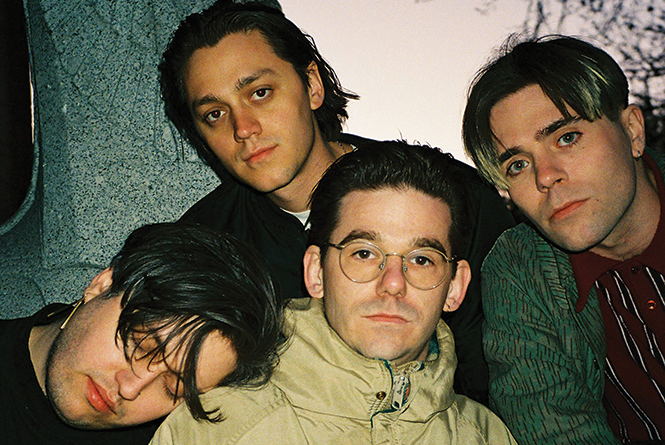
- KarenJudithDavis
At this point, local band Choir Boy isn't just a common name around town, but in indie music communities all over the world. After releasing their infectious melancholy-pop fusion of an album, Passive with Desire, in 2016—and playing shows locally and touring aggressively world-wide for the better part of the last several years—they've finally returned with their follow-up album. May 8 marks the release of Gathering Swans, a more-than-fitting follow-up that delivers a uniquely inquisitive and substance-based pop album.
"I think time and space might be the most notable for me," says bassist Chaz Costello on the development of the record. "We have been on the road so much the last few years that we kind of had to adapt how songs get made. It seemed like every time we would start making some real progress on a song, we would have to put it down to prepare for tour. At the time it felt like a burden, but I think in the long run it gave us time to sit, tinker and think out each song more, which I think helped us make the best ones we could."
While peppering new tracks into their live performances, they also took time to put an emphasis on capturing the live energy of the songs in the recorded versions. They achieved this with expertly-paced synths by Jeff Kleinman, sweeping and romantic guitar by Michael Paulsen and Costello's angst-ridden bass lines, which all perfectly convey the breadth of emotions explored in the album and by frontman Adam Klopp's expressive voice.
Klopp affirms that there was a lot of "frankensteining" of songs like "Toxic Eye," which was a built-off-a-riff track finally finished in a night between himself and the tone- and detail-oriented guitarist Paulsen. Songs like "Sweet Candy" took longer to bring to life, though. The only song that they had difficulty fleshing out on stage, it finally came together during a psychedelia-tinged recording session. The result is, interestingly, a song that is equal parts "campy pop" and a new, effective aestheticism, representative of the themes of desire and foreboding that are the meat of the whole album.
"Sweet Candy" paints the image of a narrator for whom forbidden desire holds the potential to make him "happy to be bad"—a reference that comes up later via the song "Happy to Be Bad." There, very differently, the narrator seems consumed by the sweetness of a love attained and indulged in—all while a certain dread can still be felt in lyrics like "nailed to the cross of your affection." This love song, filled with its clash of bliss and anxiety, meets the rest of the songs well—whether they're the chunk of "self-help or self-critique" songs made up by darkly rhythmic singles like "Toxic Eye," "Complainer" and similar stand-outs like "Eat the Frog" and "Shatter," or songs of love's fading like "Nites Like This."
While Klopp's lyrics might suggest thinking himself in circles about the cycles of life or love—with the layout of the album giving each song a thematic match on the opposite end—he constantly returns to the intense potential that exists on either side of desire. Klopp's narrators feel the urge to indulge in desire, to feel love and all that comes with it, as much as they do the urge to leave something "stale" behind despite fear of what may follow. With another reference to "Sweet Candy," Klopp says, "['It's Over'] parallels 'Sweet Candy' in a sense, because it's from the perspective of someone who has indulged in a romantic chase, and it's done and now they don't know what to do. It's the jaded emotion of defeat ... they're jumping ship." Since that's the opening track, one could see it and its dread sensation of jumping off into the unknown as signaling everything about and within the album—the need to move forward, into new or out of the old.
Klopp finds an existential question in this cycle of beginnings and ends. "Nothing matters and nothing really means anything," he says matter-of-factly. "But you have to define your own meaning to survive, or at least have happiness. And so that's what 'gathering swans' means—to create that happiness or meaning for yourself."
That closing title track—a slow, haunting and ethereal waltz—sharply departs from and yet perfectly concludes the aching pop of the rest of Gathering Swans. The album's sway between sorrow and joy, hope and uncertainty, seems particularly relevant right now, with the music world and Choir Boy's place in it hanging in the balance of the global pandemic.
While initially disappointed that all their hard-won fans won't hear the album live for some time due to canceled tours, Klopp began to consider what exactly making music and playing live meant to him, something he'd already begun to ask himself after years of touring for bigger and bigger audiences. The pandemic hasn't brought him much closer to an answer—at least, not one besides the one provided by Gathering Swans itself, that "things matter to people because they themselves make them matter." In this strange new world, identifying the things that matter is a daily business of worry and hope, and Gathering Swans might just be the perfect soundtrack to it all.